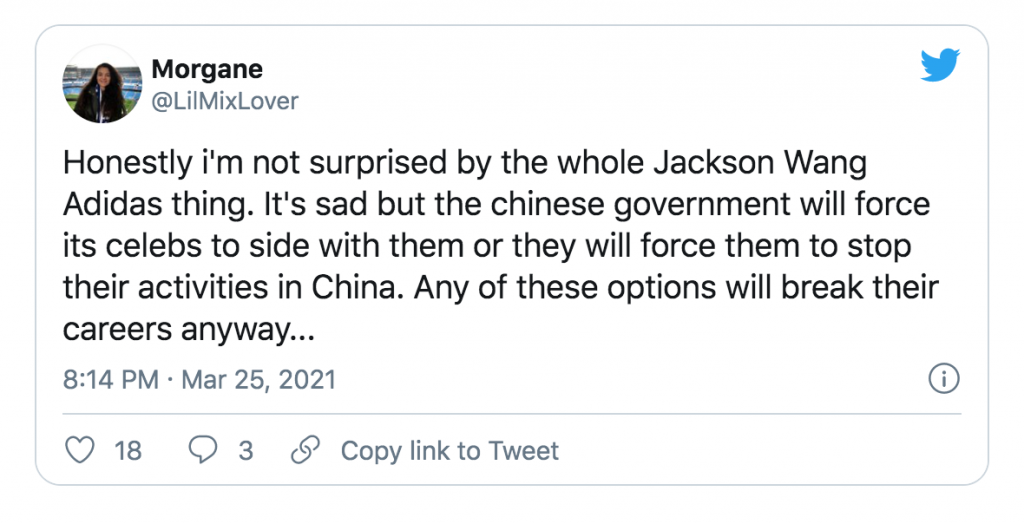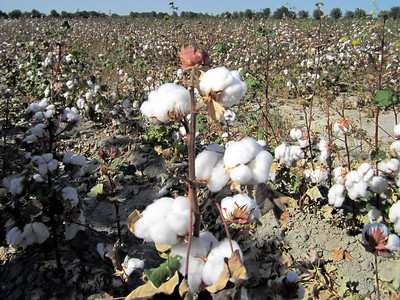Days after the coordinated sanctions on Chinese officials for their responsibility and/or complicity in the genocide of Uyghurs and other Turkic Muslims in Xinjiang via surveillance, imprisonment, torture, sterilization, and forced labor, tens of American and international fashion brands have severed partnerships with Xinjiang businesses likely tied to forced labor of minorities. A year ago this month, in March 2020, the Australian Strategic Policy Institute released a groundbreaking report highlighting “82 foreign and Chinese companies potentially directly or indirectly benefiting from the use of Uyghur workers outside Xinjiang through abuses labour transfer programs.”
Some of these identified companies, including Swedish fashion brand H&M, sportswear brands Nike and Adidas, Gap, Uniqlo, and more, have released statements of their own in which they make a commitment to divesting from the Xinjiang region where Uyghur and other minorities are led on to trains and transferred to factories to work against their will; factories that had for years been a major player in the supply chain of these famous brands:
“H&M Group is deeply concerned by reports from civil society organizations and media that include accusations of forced labour and discrimination of ethnoreligious minorities in Xinjiang Uyghur Autonomous Region (XUAR). We strictly prohibit any type of forced labour in our supply chain, regardless of the country or origin. XUAR is China’s largest cotton growing area, and up until now, our suppliers have sourced cotton from farms connected to Better Cotton Initiative (BCI) in the region. As it has become increasingly difficult to conduct credible due diligence in the region, BCI has decided to suspend licensing of BCI cotton in XUAR. This means that cotton for our production will no longer be sourced from there.”
“Following today’s launch of the NGO Call to Action, the recent publication of several new reports, the signing into law of the Uyghur Human Rights Policy Act, and the release of a business advisory by the U.S State, Treasury, Homeland Security, and Commerce Departments regarding supply chain risk in the Xinjiang Uyghur Autonomous Region (XUAR), we want to reiterate our continued focus on identifying and eradicating forced labor. A successful solution for all involved, above all the workers themselves, will require state-to-state engagement and collaborative partnerships across government, industry, labor advocacy groups, non-governmental organizations, and other stakeholders.” – Joint Statement by the American Apparel & Footwear Association (AAFA), the National Retail Federation (NRF), the Retail Industry Leaders Association (RILA), the United States Fashion Industry Association (USFIA), and the Footwear Distributors and Retailers of America (FDRA)
Now, however, a whole year after numerous fashion companies have rescinded their contracts and partnerships with Xinjiang supply companies, more than 50 high-profile Chinese celebrities, actors, and musicians have posted on their personal Weibo accounts that they will no longer work with the brands they had represented because the companies, by condemning Xinjiang forced labor schemes, had been “spreading false rumors” that damage China’s “national sovereignty and territorial integrity”, dignity, and reputation. Many of these celebrities also later took to social media to make statements hashtagged “I support Xinjiang Cotton”.
Here is a list of just a few of the many notable celebrities who have cut ties with fashion brands and denied evidence of forced labor in Xinjiang:
- Wang Yibo, 23, actor and musician, cut ties with Nike. His company, Yuehua Entertainment, said “Our company and Mr. Wang Yibo firmly objects to any remarks and actions that stigmatise China. The dignity of the country cannot be violated and we resolutely safeguard the interests of the mother land.”
- Seven Tan Songyun, 30, actress, cut ties with Nike, and stated that “We firmly oppose any malicious actions aimed to discredit and spread rumors about China!”
- Nana Ouyang, 20, Taiwanese cellist, cut ties with Converse. On the same day, she appeared in a Chinese propaganda video stating “Taiwanese should never forget their roots” and promoting cross-strait unification of China and Taiwan.
- Jackson Wang, 26, Hong Kong rapper and musician, cut ties with Adidas. His agency, Team Wang, announced that “from now on, this studio and Mr. Jackson Wang will terminate all cooperation with the brand Adidas Originals. The country’s interests are above all else. This studio and Mr. Jackson Wang are firmly opposed to all malicious acts that discredit China.”
- Zhang Yixing, 30, actor and singer, cut ties with both Samsung and Calvin Klein not long after his representative warned the companies that their lack of support for the one China policy was a “careless mistake.” His representative’s new statement explains “Zhang deeply loves his country and supports the one China policy. He is against any acts or words that split his country. All brands that collaborate with him should be careful about the issue.”
Important to note however, is that there is heavy speculation regarding whether these celebrities, as global representatives of Chinese culture, influence, and talent, have no choice but to support the Chinese government for fear that they or their families will face severe punishment and rebuke by the government, including an abrupt end to their career both in China and in South Korea, where many of them are members of K-pop bands.

Cover image by David Stanley on Flickr (CC BY 2.0)

